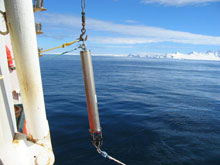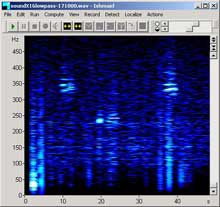Deploying the second hydrophone (2) off Livingston Island. Click image for larger view and image credit.
A spectrogram of marine mammal calls observed by a hand held hydrophone in Marion Cove near Korean Antarctic base. Click image for larger view and image credit.
King George Island, Antarctic
December 8, 2005
William Hanshumaker
Oregon State University
Public Marine Education Specialist
Extension Sea Grant Faculty
Weather: Low clouds in the morning with temperatures
hovering below freezing. Clearing skies throughout the afternoon,
Winds: Variable between 0-10 knots
Seas: Calm, with one to two foot seas, with increasing swells as we
approach Drake Passage
It snowed this morning. Considering where we are, this should be no large surprise, but it is a big change from yesterday. Fortunately, the seas are still calm, so the deployment of the hydrophones proceeded as scheduled. Due to the low clouds, visibility for the bird and marine mammal survey was initially poor, but improved as the day wore on. We were rewarded with our first cetacean sighting. Sara spotted two Minke whales, lunge feeding for their lunch. We hope to confirm their calls when the hydrophones are recovered next year.
The team was up early this morning to deploy the fifth hydrophone. The sixth and final one for the Bransfield Strait array was in the water by 2:00. We are steaming toward the Drake Passage to install the seventh and final hydrophone. The Yuzhmorgeologiya is making about 12 knots, so we should be on station when we awake tomorrow.
The RV Yuzhmorgeologiya is a fine research vessel. Her crew is entirely Russian and they perform their roles well. Since the collapse of the Soviet Union, this vessel is run as a "Federal Unitary Geological Enterprise" company, and is administered by a general director with an office in Washington. While at sea, however, it is the Captain who rules the ship. I have had little contact with him, and interface mostly with the fine liaison officers, who speak English and have an excellent grasp of our scientific needs. I have not had the opportunity to meet many of the other crew, since the laboratories and other work areas are concentrated near the stern of the ship. They also have a separate mess hall. There are signs in Russian and English throughout the ship to accommodate everyone. Arrows strategically placed on the bulkheads keeps us from getting lost in the 300 feet we are calling home.
It is easy to find the mess hall. You just follow your nose. The food is excellent and counting the 3:30 "Teatime", there are four meals a day. Dinner tonight was a delight. Good food combined with good conversation. The weather was in constant flux, ranging from sunny skies to swirling snow and then back again to sunny skies. We spotted two unidentifiable whale spouts in the distance. Flocks of petrels struggled to keep pace with the ship. As we left Elephant Island astern, the sun slowly set on the western horizon. At 10:00 in the evening, it was the longest and most spectacular sunset I've ever experienced.
Sounds of the Southern Ocean will be sending several reports from Dec 3 - 13. Please check back for additional logs from this expedition.
Sign up for the Ocean Explorer E-mail Update List.














